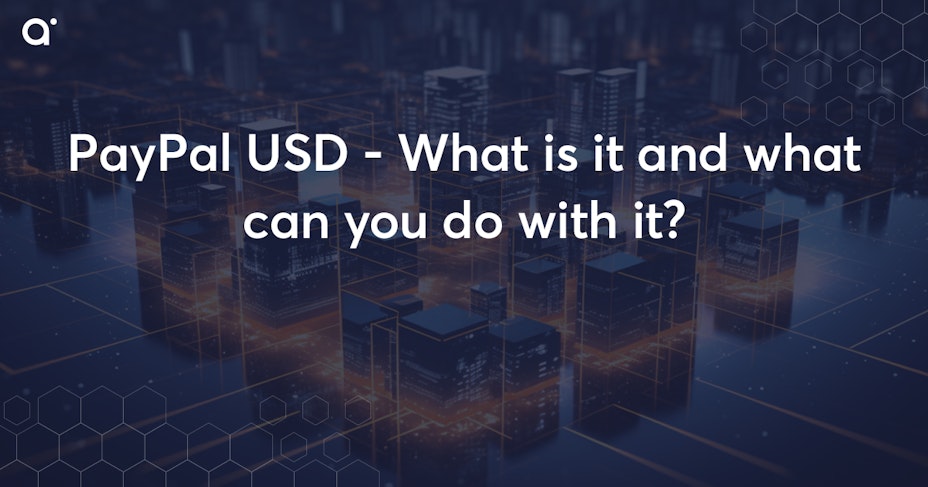PayPal USD - What is it and what can you do with it?
- 4 minute read

With the introduction of PayPal USD, payment service PayPal is trying to bridge the gap between Web3 and fiat currency. What is it and what can you do with it?

Brief summary:
✔️ PayPal USD (PYUSD) is developed by PayPal and is a stablecoin on the Ethereum blockchain.
✔️ The PYUSD token is issued by Paxos Trust Company.
✔️ PayPal USD will be fully backed by deposits in US dollars, US government bonds, and similar cash equivalents.
Table of Contents
- What is PayPal USD (PYUSD)?
- Paxos Trust Company issues the token
- Who is PYUSD available to?
- How does PYUSD prevent a depeg?
- Criticism of PYUSD
- Conclusion
What is PayPal USD (PYUSD)?
PayPal USD (PYUSD) is a stablecoin which has a 1:1 value against the U.S. dollar. A stablecoin is a cryptocurrency that holds the same value as a specific fiat currency, such as the dollar and euro. The stablecoin acts as a bridge between Web3 and fiat currency and contributes to the adoption of cryptocurrencies.
The token is built on the Ethereum blockchain network and was developed by online payment service PayPal. This means that PYUSD will leverage PayPal's extensive experience in large-scale payments as well as the speed and programmability that blockchain protocols offer.
This is what PayPal CEO Dan Schulman said about the new stablecoin:
"The transition to digital currencies requires a stable tool that is both intrinsically digital and can be seamlessly integrated with fiat currencies, such as the U.S. dollar. Our commitment to responsible innovation and compliance, along with our proven track record of providing our customers with new experiences, provide the foundation necessary to contribute to the growth of digital payments through PayPal USD."
Paxos Trust Company issues the token
According to the press release of PayPal, the token will be issued by Paxos Trust Company. Paxos Trust Company facilitates blockchain solutions for financial institutions. The company is regulated by the New York Department of Financial Services (NYDFS) and was one of the first in the crypto sector to receive a trust license for digital assets.
Who is PYUSD available to?
Initially, PYUSD is available and tradable for American customers of PayPal . They can buy PYUSD, pay with PYUSD, send it to other PayPal users and convert PYUSD to other cryptocurrencies offered by the platform.
How does PYUSD prevent a depeg?
In the past, we have seen stablecoins lose their peg to the dollar, leading to depreciation, due to a liquidity shortage ( see UST ). PayPal USD will be fully backed by deposits in U.S. dollars, U.S. government bonds and similar cash equivalents. In addition, PayPal will be transparent about its reserve figures. Paxos Trust Company will disclose reserves on a monthly basis. In addition to Paxos Trust Company, a third and independent party will also publish monthly statements to confirm the figures. The reports will meet the standards of the American Institute of Certified Public Accountants (AICPA).
Criticism of PYUSD
There has also been criticism of PayPal's new stablecoin. On X (formerly Twitter), several Twitter users are reporting that PYUSD's contract resembles a CBDC . For example, PayPal would have the power to freeze or burn users' PYUSD tokens.
Conclusion
The introduction of PayPal USD (PYUSD) as a stablecoin marks an important step in the evolution of traditional finance. Through close oversight by the New York Department of Financial Services (NYDFS) and issuance by Paxos Trust Company, PYUSD promises to provide a reliable and responsible alternative to traditional fiat currencies. With its 1:1 value against the U.S. dollar and support from deposits and government bonds, PYUSD appears to take solid steps to avoid devaluation. However, there is also criticism of PayPal's project. X user report that PayPal has the power to freeze and burn PYUSD tokens. Despite this, the announcement contributes to the adoption of cryptocurrencies in the traditional financial world.


